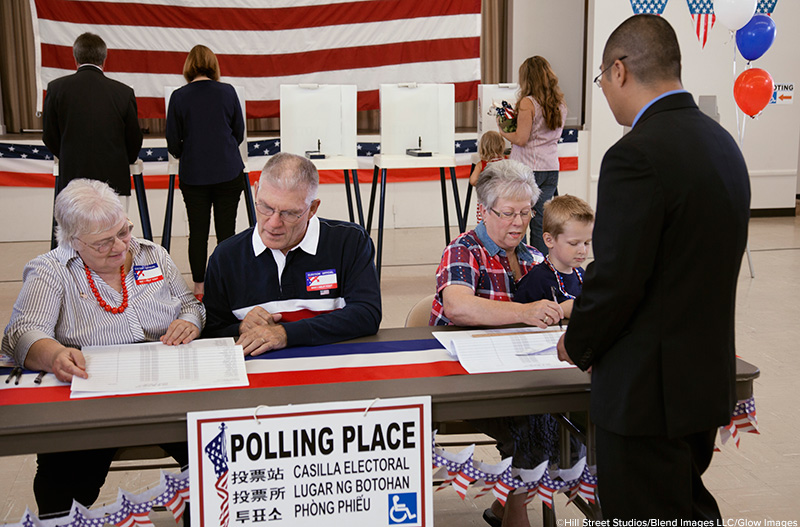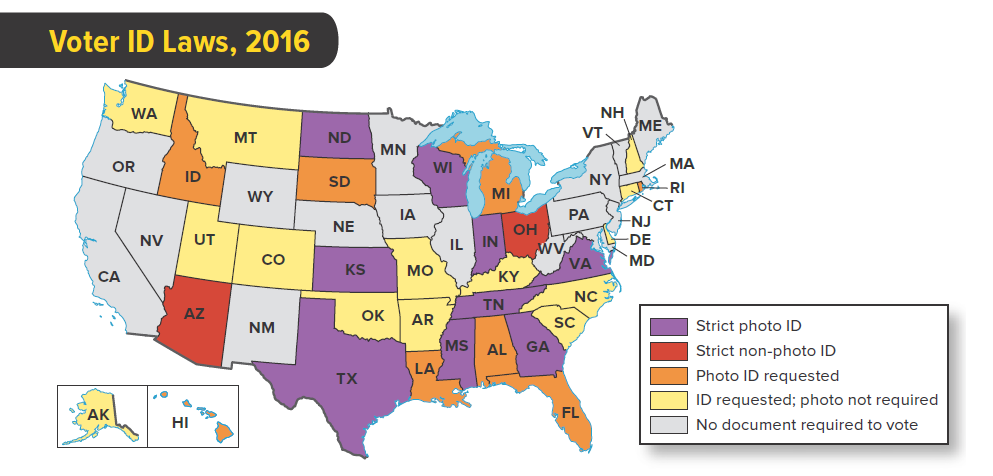Hot News
- Current Events New Alabama Congressional District Selects Candidates
- Current Events Nebraska Rejects Winner-Take-All Proposal
- Citizenship Voting Under Age 18
- Citizenship Citizenship in Action
- Democratic Party Biden’s and Trump’s Recent Primary Results
- Elections Trump and Biden Win South Carolina and Michigan Primaries

Credit: ©Hill Street Studios/Blend Images LLC/Glow Images.
Signing in at a table of electoral rolls can be a different experience for some voters
A Closer Look at Voter ID
Shortly after the 2014 midterm election, Election Central brought you a story about the controversy surrounding voter laws. In 2013, the Supreme Court case Shelby County v. Holder ruling allowed states to make election laws without federal approval. This led to several states (most of them with southern and/or Republican-controlled legislators) to adopt stricter voter identification laws. Supporters of the laws say that they are important in combating fraud, while opponents believe they unfairly discriminate against voters. As the nation continues to inch closer to the general election, let’s take another look at the specific laws of some of the states affected by such legislation.
- Texas btw and Election Central has been following and providing updates on the high-profile court case in Texas concerning its voter ID legislation. Considered one of the strictest voter ID requirements in the country, Senate Bill 14 was overturned last year. The judges that ruled in the case determined that requiring forms of ID that were traditionally more difficult for low-income, Latino and African-Americans to obtain was discriminatory. The case is currently in the appeals process, however. Fifteen judges from the U.S. Circuit Court of Appeals in New Orleans, will hear arguments from both sides of the issue.
- Kansas Just this month, a federal judge ruled that the state of Kansas is not allowed to require proof of citizenship (like a birth certificate, passport, or certificate of citizenship) in order to register to vote. Doing so was ruled to be a violation of the National Voter Registration Act of 1993. That legislation calls for, “only the minimum amount of information” (like a photo ID and a piece of mail with a person’s name and address) to determine a person’s eligibility to vote. The ruling will allow those registrations that have been “on hold” to be processed in time for the general election. The state will likely appeal the decision.
- North Carolina The Tarheel state is another state, like Texas, included in the category of strictest ID requirements in the country. Unlike Texas and Kansas, a federal judge recently upheld its 2013 law that, among its restrictions, includes no pre-registering teens before they turn 18, prohibits people from registering and voting on the same day, disqualifies ballots cast in the wrong precinct, and reduces the number of “early voting” days. The opinion of the court was that the state of North Carolina had sufficiently provided legitimate interests for its voter ID laws. Law experts suspect that the case will likely be appealed to the U.S. Court of Appeals for the 4th district.



